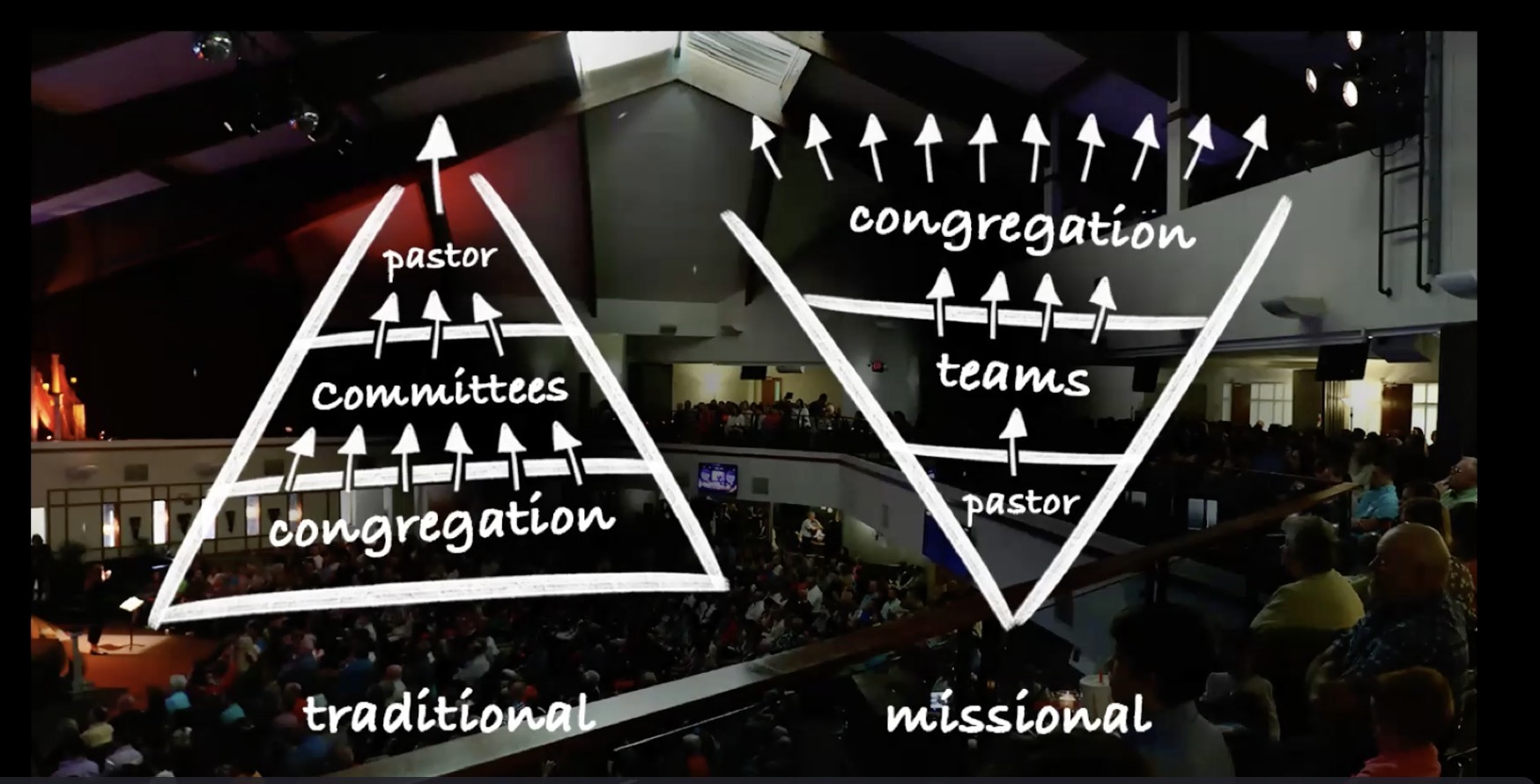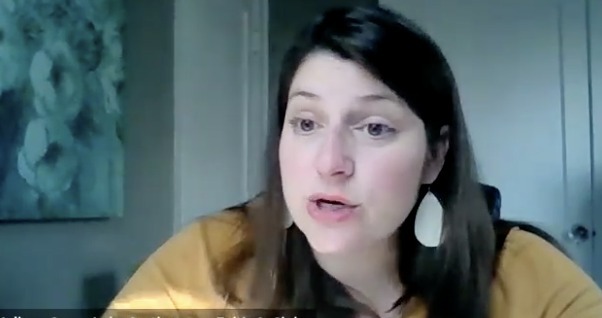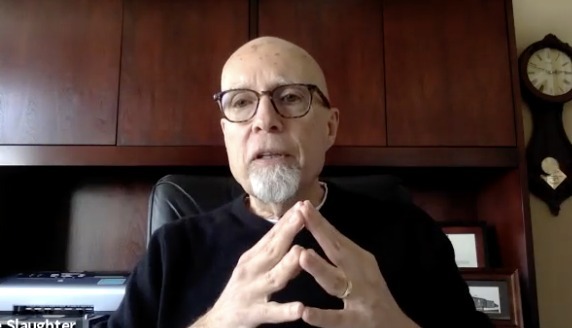
Clergy Leadership Academy: Growing missional ministry

Rev. Mike Slaughter presented two models, traditional church and missional church. Photos from Zoom sessions of Clergy Leadership Academy.
“As a body of believers, churches need to ask questions,” said Rev. Janice Thompson. She serves Zion United Methodist Church in Beresford, South Dakota, and is a Clergy Leadership Academy (CLA) participant. "Questions like— Where do we need to be? What are the needs around us? How can our ministry be about the needs we see? What do we need to do differently? How can mission define our vision? "
Clergy Leadership Academy is a three-year learning experience that equips leaders with essential skills and practices for leading in such a time as this. Thompson was one of the 23 participants at Clergy Leadership Academy that happened in a hybrid format. Small groups gathered in person at Lake Poinsett Camp and Retreat Center and the Rapid City area. Another group joined online.
“It was great for some people to gather in person. We also provided an opportunity for clergy to join online,” said Deb Kjerstad, director for Leadership Development and coordinator of CLA. “We are finding that offering options of how participants join events and meetings is important.”
Rev. Teresa Person, who serves at Huron Riverview United Methodist Church and Virgil United Methodist Church in South Dakota, participated with the group in the Rapid City area. “It was renewing to be able to step away from the day-to-day responsibilities of ministry and be together, in-person with colleagues. The beauty of nature and each other surrounded us,” she said.
Rev. Jordan Louks, who serves the United Methodist Church in Ethan, South Dakota, participated online. “The experience was refreshing. We had a chance to interact with the whole group at Lake Poinsett and Rapid City. We interacted in breakout rooms online with smaller groups.”
Developing a missional ministry was the focus of the two-day learning experience. “It is all about a Kingdom movement,” says Person. “We want to empower people to be the hands and feet of Jesus.”

Melissa Spa presents mind shifts for money to Clergy Leadership Academy.
Melissa Spas and Rev. Mike Slaughter were teachers who challenged those attending to explore a focus on mission in this post-pandemic time. Louks shares some key ideas from the teaching that gives him hope for the future. “We are in a reset moment,” says Louks. “In this post-pandemic time, people are seeking meaning, not meetings. Mission speaks to discipleship. People want to be workers, not just worshippers.”
Spas of Lake Institute, established in 2012 by the Lilly Endowment Foundation at Indiana University Lilly Family School of Philanthropy, shared three shifting mindsets related to funding and money. Fundraising is ministry, not an unpleasant activity of the church. Stewardship is the discipleship of people, not a numerical goal that happens once a year. Mission and money are connected.
Money follows mission. “Fundraising is precisely the opposite of begging. Rather we are declaring a vision that is amazing and exciting. We invite people to be disciples of that mission. Money follows the mission and becomes ministry; discipleship grows,” said Spas.
Spas message resonated with Pastor Teresa Person. “I really appreciated the idea that we need to shift our mindset of money only relating to the business of the church. It is about the discipleship of people, a formational process.”
Rev. Mike Slaughter shared his story: a local pastor for more than 45 years, in three different churches. He was at Ginghamsburg United Methodist Church for 38 years. In 2017 Slaughter founded, with Karen Perry Smith, Passionate Churches LLC. They consult with churches and coach pastors by Zoom from Hawaii to the Carolinas. There is a base camp to help people learn how to establish 501(c) 3 organizations and reach neighborhoods.
“Ministry is a calling, not a career. We never retire from the passion that God has placed on our hearts,” said Mike Slaughter.
Slaughter had a vision of what God wanted to do in the places he ws callked . When he started at Ginghamsburg UMC, he was the first full-time pastor in this rural church, 27 years old, there were about 90 people in the congregation.
“When I came to Ginghamsburg we had outhouses. The congregation had a $27,000 annual budget. In 2017, there were 5,000 in weekly attendance with a $5 million annual budget and $7 million 501 (c) 3 budget,” said Slaughter.
In 2011, Slaughter’s Dad passed, and it was life-changing. “I put life on hold to take care of my father’s affair. There were lots of matters to take care of pensions, my mother’s care,” he said.
After six weeks away, he checked the online services at Ginghamsburg UMC and saw a video—about all the ministry happening in one week. Teams from Ginghamsburg were establishing a worshipping community in Costa Rica, on a medical mission in Jamaica, providing medical resources and children’s ministry in Columbia, making initial contact and investigating in South Sudan, on a construction ministry mission in New Orleans, student ministry teams serving in Pittsburgh, Pennsylvania, and Dayton, Ohio. A true example of a missional movement.
“It was inspiring to hear Mike’s story,” says Pastor Janice Thompson. “It was affirming to hear him say, ‘you have to be you in ministry.’ I have been wondering for months who I should be, what direction my ministry might take. It just spoke to me. I need to ask, how can I do ministry being me?”

Re. Mike Slaughter presents how to grow a missional congregation to CLA.
Mike presented two models of the way churches go about ministry, the traditional and missional model.
The traditional model of church: The congregation is there and comes to worship. A small number of members are on committees that approve or disapprove of ministry that a pastor can do. The pastor comes to do ministry for them. The pastor spends most of their time in care visits, funerals, marriage counseling, performing marriages. The pastor doesn’t even have time to prepare a sermon. The pastor becomes a cork in the neck in this model of ministry. They are focused on bringing people to meetings.
Missional model of the church: The pastor identifies leaders of teams. Leaders dream, develop, and deploy ministry in teams. Much different than committees that approve or disapprove of things for a pastor or professional leader to do. These leaders and teams—dream, develop, and deploy— finding their own funding. Get rid of the committees.
“It was empowering to look at how we can grow the Kingdom by growing a missional model of church. To be the sanctuary outside the walls of the building and teaching the radical Gospel is just amazing, invigorating to me,” says Pastor Theresa. “It is about inviting people to a process of discipleship.”
According to Slaughter, there are three characteristics of every effective missional leaders—picture, plan, and practice. Every effective leader has a clear vision to live out a call or dream for God’s work. They have a plan to carry out that vision. They have a persistent practice to carry out the plan.
“It was liberating to know that as a leader, your role is equipping more people to be the hands and feet of Jesus,” says Pastor Jordan. “Even as we deal with the pandemic and the schism in the United Methodist denomination, to be reminded that God continues to offer his unending love to us and invites us to love our neighbor is truly liberating.”
Clergy Leadership Academy takes place two times, in the spring and fall of each year. All clergy are invited.
“After a year of several challenges personally and professionally. I left inspired to live out who God has called me to be and invite others to live out the call on their lives,” said Thompson.